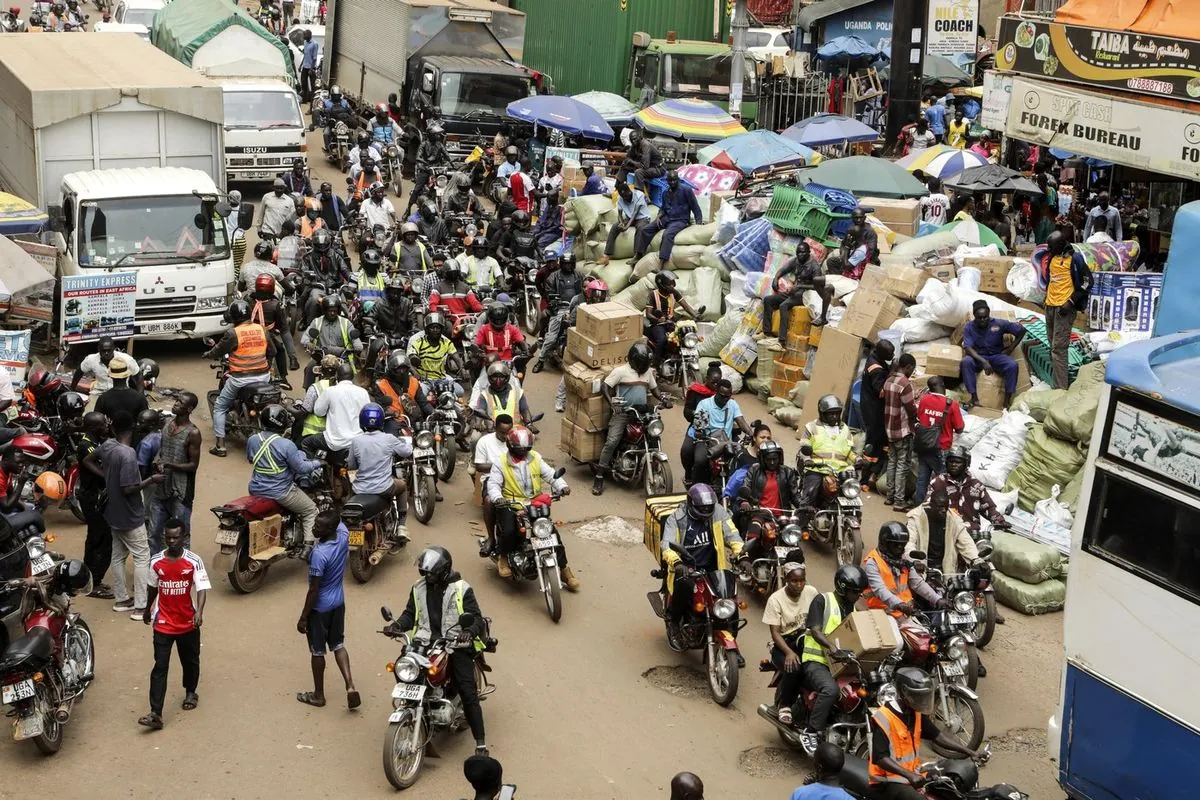In Kampala, Uganda's capital, the roar of motorcycle engines has become the soundtrack of daily life. These two-wheeled taxis, known as boda-bodas, have proliferated rapidly, reflecting the country's pressing unemployment issues and transforming urban transportation.
An estimated 350,000 boda-bodas now navigate Kampala's streets, serving a population of approximately 3 million. This phenomenon is not unique to Uganda; similar scenes play out in other East African capitals like Nairobi and Kigali. However, the scale of Kampala's boda-boda boom is unprecedented in the region.
The surge in boda-boda numbers is directly linked to Uganda's unemployment crisis. With 76% of the country's 43 million people under 35 and job opportunities scarce, many young men turn to boda-boda driving as a last resort. The unemployment rate for those aged 18-30 stands at 17%, rising to 19% in urban areas.
Zubairi Idi Nyakuni, a boda-boda driver, explains the situation: "We just do this one because we have nothing to do. All of us here, other people even, they have their degrees, they have their master's (degrees), but they are just here. They have nothing to do."
The economic landscape in Uganda is challenging, with only 1% of the 22.8 million employees earning $270 or more monthly. This stark reality pushes many into the informal boda-boda sector, despite the associated risks and challenges.
While boda-bodas provide essential transportation services, they also pose significant safety concerns. Fatal accidents involving motorcycles in Uganda increased from 621 in 2014 to 1,404 in 2021. The industry's rapid growth has outpaced regulatory efforts, leading to a culture of non-compliance with traffic rules.
Winstone Katushabe, a government commissioner overseeing transport regulation, acknowledges the difficulties: "We've been struggling with these motorcycles. It is not a good situation."
The government's attempts to regulate the industry have been met with resistance. Boda-boda drivers, fearing loss of livelihood, have pushed back against efforts to remove them from Kampala's central business district.
The boda-boda phenomenon has political implications as well. President Yoweri Museveni, who has held power since 1986, has long recognized the political potential of boda-boda drivers as mobilizers of support. This relationship has influenced policies, including recent reductions in licensing fees from nearly $100 to about $35 for a three-year period.
The industry's growth has also spawned related businesses. Companies like Tugende specialize in financing boda-boda purchases, typically priced around $1,500 for a new motorcycle. This system allows drivers to own their vehicles eventually but can create significant pressure to meet daily payments.
Innocent Awita, a boda-boda driver who left school in 2008, describes the challenges: "I can work for three days without getting anything. But if I get something the next day, that can save my life."
As Kampala grapples with the boda-boda phenomenon, it's clear that these motorcycle taxis represent more than just a mode of transport. They embody the complex interplay of unemployment, urbanization, and political dynamics in modern Uganda. While they provide a crucial lifeline for many, the industry's unregulated growth poses ongoing challenges for city planners and policymakers alike.
"We must appreciate where the boda-boda comes from, how this whole phenomenon grew. You have quite a large number of people that are young, who can't find jobs to do, whether in the public sector or the private sector, and they do not have significant alternative income to get into other enterprises."
As Uganda looks to the future, finding a balance between supporting this vital informal sector and addressing its associated risks remains a critical challenge. The boda-boda boom in Kampala serves as a stark reminder of the need for comprehensive solutions to unemployment and urban development in rapidly growing African cities.
